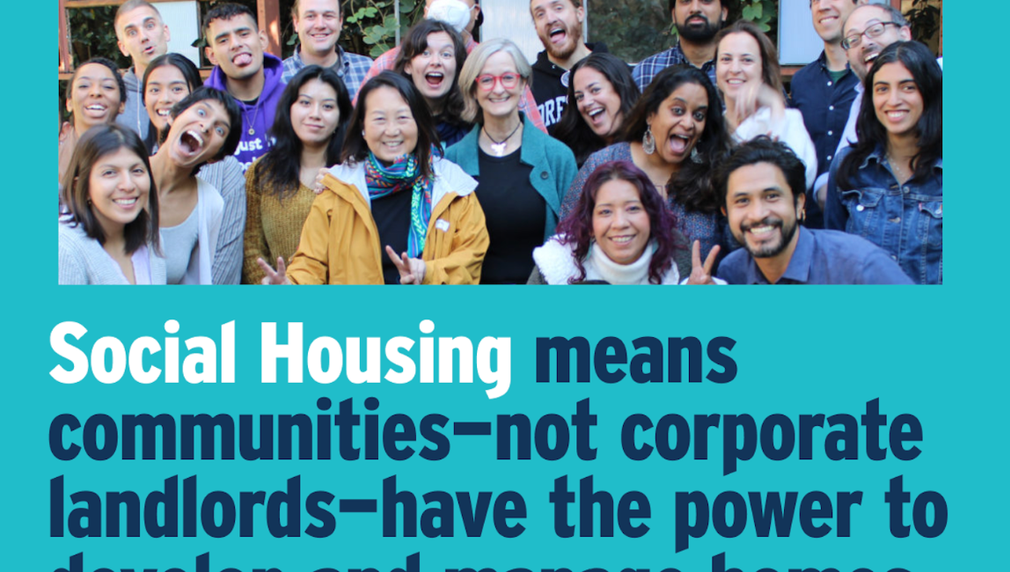Roadmap to Decommodified Housing 2050
LA is experiencing an extreme housing crisis due to the private market’s inability to provide secure housing for low-income tenants. To address this, the LA Housing Movement Lab’s (LAHML) coalition of 25+ housing justice organizations from across LA county is building a Roadmap to Decommodified Housing which will outline 25-year strategy, tactics, metrics, and infrastructural analyses to guide the housing movement in decommodifying [to make permanently affordable and community controlled] 20% of LA’s housing stock.

What is the primary issue area that your application will impact?
Affordable housing and homelessness
In what stage of innovation is this project, program, or initiative?
Pilot or new project, program, or initiative (testing or implementing a new idea)
What is your understanding of the issue that you are seeking to address?
Between a deficit of 500,000 affordable homes, 50% of tenants being considered rent-burdened, and over 70,000 unhoused community members, LA is experiencing an undeniably extreme housing crisis. Since 2019, LAHML has convened our member orgs to analyze the the underlying disease plaguing our housing ecosystem. Through these convenings, we have determined that the large landlords and investment vehicles [who own 75% of LA County’s rental housing] are driving our housing crisis. These private-actors have transformed our communities and homes into investments; and they work to maximize profit by neglecting upkeep, filing mass evictions, and hiking up rents and fees. These tactics disproportionately impact black, brown, and low-income communities. To address this, the LAHML is assembling an extensive strategic roadmap to resist corporate control of housing and guide us in our movement to decommodify [make permanently affordable and community controlled] 20% of LA’s housing stock by 2050.
Describe the project, program, or initiative this grant will support to address the issue.
Because of the severity of LA County's housing crisis, our member organizations are dedicating nearly all their resources to keeping people housed. While we have been successful, with huge wins like Covid-19 Renter Protections, Universal-Just Cause Evictions, and Right to Counsel, it has left little capacity for to look forward to and engage with long-term vision and strategy. The LA2050 grant will resource our member organizations to dedicate staff and consultant time to convene regularly and co-create long-term strategy to decommodify 20% of LA county's housing stock and regulate corporate housing entities over the next 25 years. This "Roadmap to Decommodified Housing 2050" will be built and implemented in collaboration with our member groups, including tenant power organizations, affordable housing developers, legal partners, labor unions, community land trusts, and advocacy organizations. The core components of the roadmap are as follows.
Key strategic campaigns and their sequencing over 25 years
Policy and legal analysis
Electoral strategy
Power-building tactics and organizing curriculum
Assessment of needed public and movement infrastructure to carry out this strategy
Clearly defined roles and tactics for different sectors of the movement. Metrics for evaluating our progress
Ultimately, this roadmap will serve as a centralized resource for groups across LA to build alignment with our long-term vision of corporate regulation and decommodification of housing.
Describe how Los Angeles County will be different if your work is successful.
Ultimately, following through on this roadmap would regulate the corporate landlords driving our housing crisis; and create more than 684,500 units of decommodified housing [20% of LA County’s Housing Stock] by 2050. These decommodfied units would enjoy significant rent stability like BVCLT in K-town, where rent for a studio is currently ~500 dollars, and has hardly risen in the last 25 years. In contrast, rent in the surrounding neighborhoods have nearly tripled in that same time, largely due to the speculative investment of large landlords. With the significant expansion of decommodified housing, rent will become disconnected from the profit-motive of large landlords, and instead used as a community resource to maintain buildings and support communities. The result: lower rents, lower eviction rates, less displacement, better housing conditions, less homelessness, decreased income inequality, increased youth educational outcomes, and higher levels of food security across LA county.
What evidence do you have that this project, program, or initiative is or will be successful, and how will you define and measure success?
While the Roadmap project only began this year, we have convened housing justice organizations across sectors to build long term strategy since 2019, and it has yielded incredible results. Most notably, we incubated ACT-LA’s Social Housing Campaign, which is expected to generate 60 million dollars a year for permanently affordable, community owned [decommodified] housing. At a high level, we will measure our success with this Roadmap through the frequency of transformative campaign wins, like Social Housing, that move us towards 20% decommodified housing. At a concrete level, we will evaluate our progress through metrics such as # of tenant leaders who understand decommodified housing and # of organizations dedicating full-time staff to decommodification and/or corporate regulation campaigns. Our most explicit metrics for tracking success will be the # of decommodified units we produce by 2050, as well as the strength of regulations placed on corporate housing in that same period.
Describe the role of collaborating organizations on this project.
Sandra McNeil: coordinate and lead convenings for decommodify 20% strategy
Little Tokyo Service Center: conduct financial, infrastructural, and production analysis for roadmap. ACT-LA: support policy analysis for decommodify 20% strategy
Movement Lab: Coordinate and lead convenings for corporate landlord strategy cohort. SAJE: Research and policy development for corporate landlord strategy cohort
CPC: Conduct 1:1s to generate interest in corporate landlord strategy cohort, HRCSF: develop curriculum for corporate landlord strategy cohort
Approximately how many people will be impacted by this project, program, or initiative?
Direct Impact: 400.0
Indirect Impact: 684,500.0